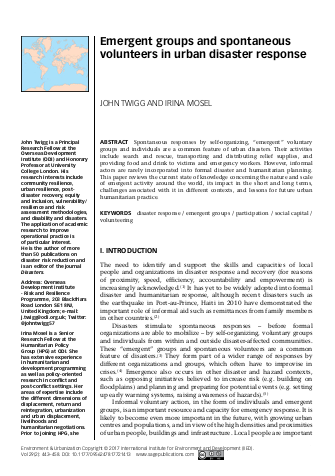
The need to identify and support the skills and capacities of local people and organisations in disaster response and recovery is increasingly acknowledged. Yet their role has not been widely acknowledged in formal disaster and humanitarian response, although recent disasters such as the earthquake in Port-au-Prince, Haiti in 2010 have demonstrated the importance of informal aid such as remittances from family members in other countries.
Spontaneous responses by self-organising, 'emergent' voluntary groups and individuals are a common feature of urban disasters. Their activities include search and rescue, transporting and distributing relief supplies, and providing food and drink to victims and emergency workers. However, informal actors are rarely incorporated into formal disaster and humanitarian planning.
This article reviews the current state of knowledge concerning the nature and scale of emergent activity around the world, its impact in the short and long terms, challenges associated with it in different contexts, and lessons for future urban humanitarian practice.
It finds that the work of emergent groups and spontaneous volunteering should be seen as 'a significant coping response in times of crisis, augmenting the capacity of established organisations to meet shifting demands'. Both improvisation and creativity are required to build networks and relationships between organisations and incorporate volunteers within organised initiatives.
Links
Resource collections
- UN Habitat - Urban Response Collection
- Urban Response - Urban Crisis Preparedness and Risk Reduction
- Urban Response Collection - Community Engagement and Social Cohesion
- Urban Response Collection - Economic Recovery
- Urban Response Collection - Environment and Climate Change
- Urban Response Collection - Housing, Land and Property
- Urban Response Collection - Urban Crisis Response, Recovery and Reconstruction
- Urban Response Collection - Urban Resilience
